
The Absa Cape Epic isn’t a young man’s event. That’s according to the 2017 rider statistics that show that only 12% of the male entrants this year were younger than the age of 30. Also notable is that 27% of the entrants spent more than six months training for the 2017 edition of the world’s most prestigious mountain bike stage race and that the average men’s rider weight was just 76kg. For more rider statistics from the men and women that competed in the 2017 Cape Epic, read on.
By Sean Badenhorst and Shikara Nel
Photos by Dino Lloyd
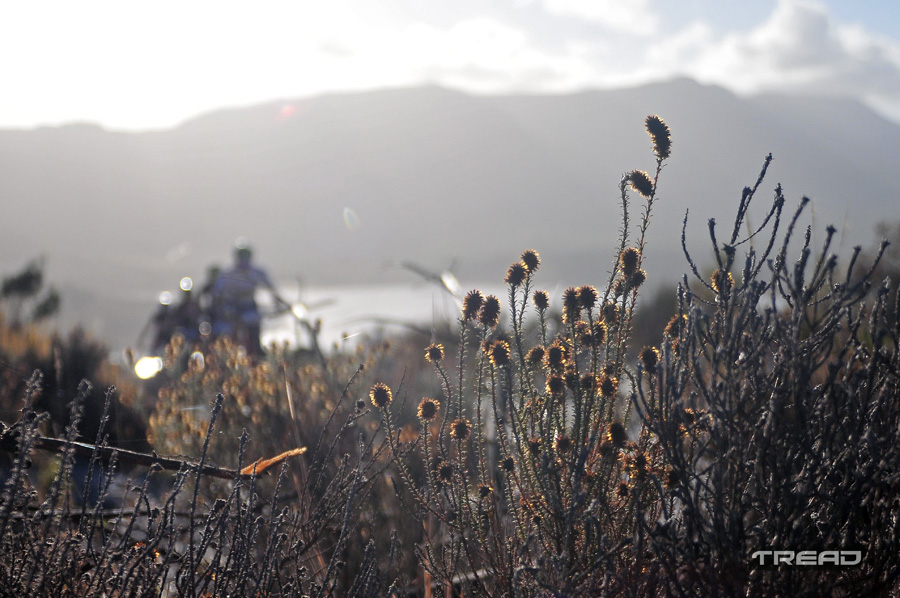
Photo: Dino Lloyd/Tread MTB
We all know that you don’t start the Cape Epic for fun. Not if you’re committed to finishing the event. No matter how conditioned you are, the annual mountain bike race in the Western Cape will always be a challenge. It will challenge you during the months of preparation and it will challenge you during the eight racing days. It will dare you, it will humble you and it will undoubtedly change your life. The Cape Epic is one of the most significant challenges its finishers will ever conquer.
That’s part of the attraction for over 1200 mountain bikers each year. You always finish a Cape Epic richer than when you started. Not richer financially, obviously, but richer personally. It’s inevitable. It’s why humans make great sacrifices and take on great physical challenges like the Cape Epic. It’s a voluntary commitment to finishing something difficult. It’s predominantly a physical event, but it requires mental and emotional strength. Yes, the Cape Epic is a pretty solid allround test of your character.
And it’s a privilege. Most entrants appreciate that it’s a privilege. A privilege having an entry. A privilege to be healthy enough to tackle something this daunting. A privilege to have the appropriate equipment. A privilege to be able to be a part a world class event in our own country.
There were entrants from over 40 countries tackling the Cape Epic this year. Here are some interesting statistics from the rider survey that was completed by 1141 of the 1332 entrants.
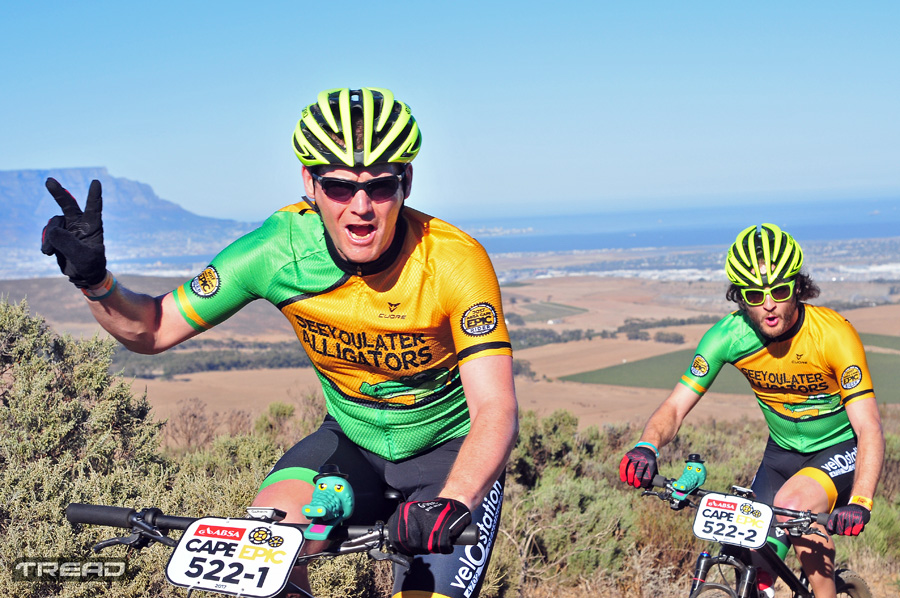
Photo: Dino Lloyd/Tread MTB
Average weight in kilograms
| Male | Female | |
| 2007 | 78 | 60 |
| 2008 | 79 | 59 |
| 2009 | 79 | 60 |
| 2010 | 78 | 55 |
| 2011 | 77 | 58 |
| 2012 | 78 | 59 |
| 2013 | 79 | 59 |
| 2014 | 78 | 60 |
| 2015 | 79 | 59 |
| 2016 | 78 | 59 |
| 2017 | 76 | 59 |
| Average | 78.1 | 58.8 |
Make no mistake, starting the Cape Epic with any extra weight is going to show in your performance. You’ll labour more up the steep climbs and you’ll be less agile elsewhere. There’s been very little change in the average weights of men and women in the race for the past decade, but this year, the average men’s weight was at its lowest – 76kg.
The average women’s weight has remained very constant for the past 11 editions apart from 2010, when it was 55kg.
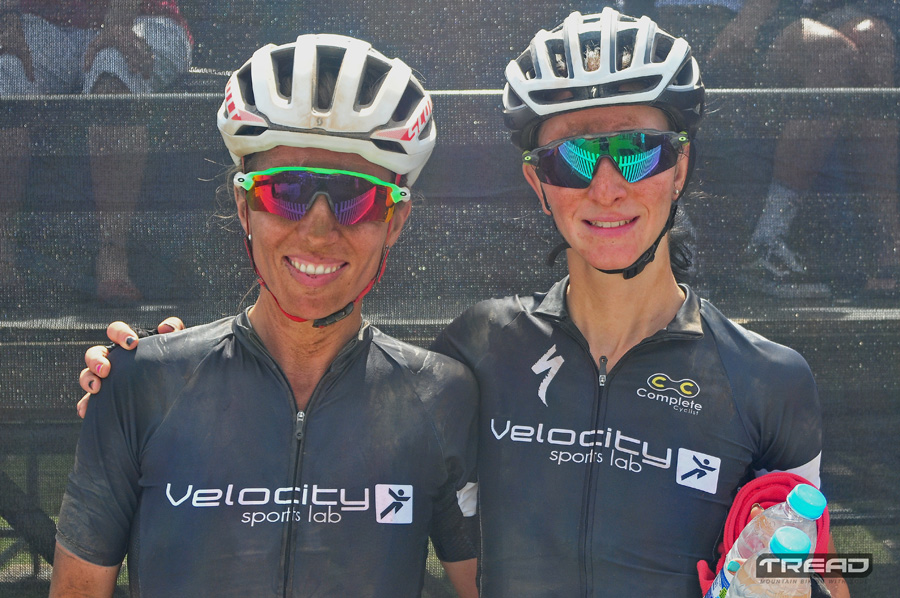
Photo: Dino Lloyd/Tread MTB
Age breakdown
| Ave age | 18-25 | 26-30 | 31-35 | 36-40 | 41-45 | 46-50 | 51-55 | 56-59 | >60 | Total | |
| 2017 Male | 42 | 5% | 7% | 10% | 17% | 24% | 21% | 11% | 4% | 2% | 91% |
| 2017 Female | 37 | 7% | 15% | 23% | 24% | 14% | 8% | 7% | 2% | 0% | 9% |
It’s not that the Cape Epic isn’t suited to younger riders, it’s just that the commitment required is more in line with men mostly in their 40s (45%) and women mostly in their 30s (47%). Commitment including costs, training time and racing time.
Months of preparation:
| 3 | 4 | 5 | 6 | 7 | 8 | 9 | 10 | >10 |
| 12% | 17% | 16% | 28% | 4% | 5% | 2% | 3% | 13% |
Training hours per week
| 1-5 hours | 6-10 hours | 11-15 hours | 16-20 hours | >20 hours |
| 1% | 26% | 56% | 14% | 3% |
A total of 68% said they followed a prescribed training plan for the 2017 Cape Epic. Although the biggest percentage (28%) say they began serious preparation in September 2016 (six months out), 45% fitted in their preparation in less than six months. A total of 27% said their training build-up period was longer than six months.
Training aids
| 2007 | 2008 | 2009 | 2010 | 2011 | 2012 | 2013 | 2014 | 2015 | 2016 | 2017 | |
| HRM | 85% | 85% | 84% | 86% | 82% | 83% | 84% | 84% | 86% | 86% | 84% |
| Power meter | 16% | 18% | 19% | 19% | 18% | 20% | 22% | 30% | 35% | 43% | 42% |
| GPS | N/A | 23% | 26% | 29% | 43% | 54% | 67% | 77% | 86% | 91% | 88% |
A decade on, heart-rate measurement in training and racing remains important to most Cape Epic entrants. The growth of the GPS isn’t really surprising and most GPS units these days also allow for heart rate measurement. Although more widely available these days, bike-mounted power meters remain a nice-to-have and aren’t used by the majority of Cape Epic participants. Yet.
Start and finish stats (complete teams) since 2006
| Year | All Start | All Finish | % teams DNF |
| 2017 | 666 | 503 | 24.4% |
| 2016 | 648 | 483 | 25.5% |
| 2015 | 624 | 512 | 18% |
| 2014 | 620 | 522 | 15.7% |
| 2013 | 630 | 496 | 21.4% |
| 2012 | 605 | 481 | 20.5% |
| 2011 | 604 | 496 | 18% |
| 2010 | 589 | 445 | 24.5% |
| 2009 | 598 | 503 | 16.1 % |
| 2008 | 599 | 435 | 27.4% |
| 2007 | 624 | 468 | 25% |
| 2006 | 466 | 379 | 19.1% |
| Ave | 606 | 477 | 21% |
As mentioned in a recent article about the relative difficulty of the 2017 edition Hard Race or Soft Riders? the did-not-finish percentage of teams was lower than in 2016, by 0.9%, but higher than the average of 21%. Interestingly, with 666 teams, it was the biggest Cape Epic field yet.
The 2008 edition still boasts the highest team DNF percentage. At 966km over nine days, this was the longest edition of the race. It also had 18 529m of ascent! The 2017 edition was 691km over eight days with 15400m of ascent, shortened to 651km with 14550m of ascent.
All categories start and finish stats
| 2017 | Teams Totals | % of Teams That DNF | Number of Solo Finishers | Total Finishers Team + Solo | Total % Finishers Team + Solo |
| All Teams Start | 666 | ||||
| All Teams Finish | 503 | 24.4% | 1121 | 84.1% | |
| Men Teams Start | 292 | ||||
| Men Teams Finish | 224 | 23.3% | 54 | 502 | 85.9% |
| Women Teams Start | 27 | ||||
| Women Teams Finish | 23 | 14.1% | 4 | 50 | 92.6% |
| Masters Teams Start | 214 | ||||
| Masters Teams Finish | 161 | 24.8% | 38 | 360 | 84.1% |
| Grand Masters Teams Start | 64 | ||||
| Grand Masters Teams Finish | 45 | 29.7% | 12 | 102 | 79.7% |
| Mixed Teams Start | 69 | ||||
| Mixed Teams Finish | 50 | 27.5% | 7 | 107 | 77.5% |
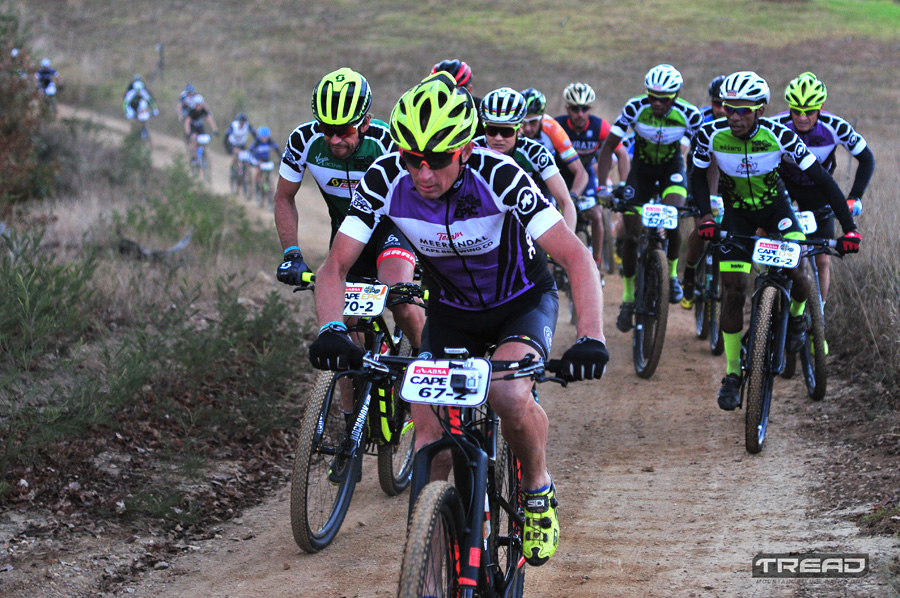
Photo: Dino Lloyd
Since the Cape Epic is a team event, most of our references to the race regarding starting and finishing stats are based on team data. However, there are solo finishers each year who carry on despite losing a teammate. We have included solo finisher numbers in this table. Taking this into account, the percentage of non-finishers at the 2017 Cape Epic was 15.9%, while the number of complete teams that did not finish was 24.4%.
General statistics after 2017
Most stage wins
Men:
38 Christoph Sauser (SUI)
20 Burry Stander (RSA)
17 Karl Platt (GER)
12 Bart Brentjens (NED)
10 Jaroslav Kulhavy (CZE)
6 Mannie Heymans (NAM)
6 Nino Schurter (SUI)
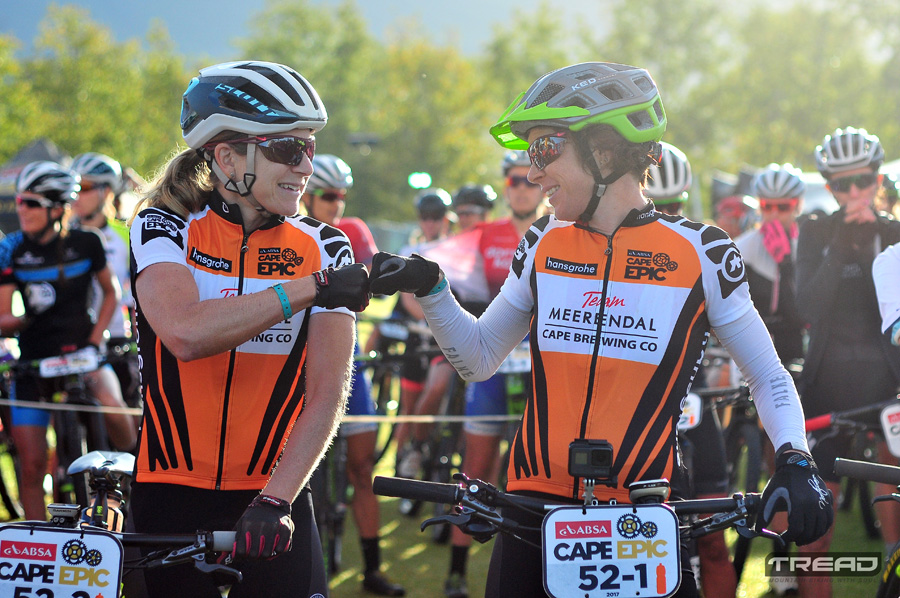
Photo: Dino Lloyd/Tread MTB
Women:
17 Hanlie Booyens (RSA), Ariane Lüthi (SUI) and Annika Langvad (DEN)
14 Sharon Laws (GBR)
12 Esther Suss (SUI)
9 Hannele Steyn (RSA)
8 Anke Moore (RSA), Yolande de Villiers (RSA) and Sally Bigham (GBR)
7 Sabine Spitz (GER)
Mixed:
18 Nico Pfitzenmaier (RSA)
15 Ariane Lüthi (SUI), Erik Kleinhans (RSA)
10 Barti Bucher (SUI), Paul Cordes (RSA), Yolande Speedy (RSA)
8 Thomas Frischknecht (SUI), Jenny Rissveds (SWE)
Masters:
26 Bart Brentjens (NED)
25 Abraao Azevedo (BRA)
18 Shan Wilson (RSA)
17 Andrew McLean (RSA) and
14 Linus van Onselen (RSA)
13 Doug Brown (RSA)
12 Nico Pfitzenmaier (RSA)
11 Carsten Bresser (GER) and Udo Boelts (GER)
10 Robert Sim (RSA)
Grandmasters
32 Heinz Zoerweg (AUT)
26 Barti Bucher (SUI)
8 Andrew McLean (RSA)
Africans (and South Africans) in the Cape Epic overall top 10 since 2006:
2017 – 3 (3 SA)
2016 – 3 (3 SA)
2015 – 8 (8 SA)
2014 – 5 (5 SA)
2013 – 4 (4 SA)
2012 – 8 (8 SA)
2011 – 3 (1 SA)
2010 – 5 (5 SA)
2009 – 5 (3 SA)
2008 – 6 (5 SA)
2007 – 4 (3 SA)
2006 – 10 (6 SA)
South African Cape Epic overall stage winners – men:
Burry Stander 20
Kevin Evans 4
Shan Wilson 3
David George 3
Philip Buys 3
Matthys Beukes 2
Brandon Stewart 2
Jacques Rossouw 1
Gert Heyns 1
Ben-Melt Swanepoel 1
Richard Beswick 1
Multiple overall winners:
Men
5 Christoph Sauser (SUI) 2006, 2011, 2012, 2013, 2015
5 Karl Platt (GER) 2004, 2007, 2009, 2010, 2016
3 Stefan Sahm (GER) 2007, 2009, 2010
2 Burry Stander (RSA) 2011, 2012
2 Jaroslav Kulhavy (CZE) 2013, 2015
2 Roel Paulissen (BEL) 2005, 2008
Women
3 Ariane Kleinhans (SUI) 2014, 2015, 2016
3 Annika Langvad (DEN) 2014, 2015, 2016
2 Hanlie Booyens (RSA) 2004, 2009
2 Sharon Laws (GBR) 2004, 2009
2 Sally Bigham (GBR) 2011, 2012
2 Esther Süss (SUI) 2012, 2017
South Africans that have won Cape Epic titles:
Men: Burry Stander x 2
Women: Hanlie Booyens x2, Zoe Frost, Hannele Steyn, Anke Moore, Yolande de Villiers, Karien van Jaarsveld, Yolande Speedy
Mixed: Yolande Speedy/Paul Cordes x2, Erik Kleinhans x 2, Nic White/Anke Moore
Masters: Doug Brown x 3, Andrew McLean x 2, Frank Soll, Duncan English, Fred Coleske, Linus v Onselen, Geddan Ruddock, Shan Wilson, Damian Booth
Grand Masters: Andrew Mclean, Robert Sim

The Last Lions
Only four riders have completed every edition of the Cape Epic (14 in total). They are Hannele Steyn (51), Mike Nixon (58), John Gale (48) and Craic Beech (44) – all South Africans.
For more 2017 Cape Epic analysis: The Bikes, The Gear, The Route

All rights reserved.


